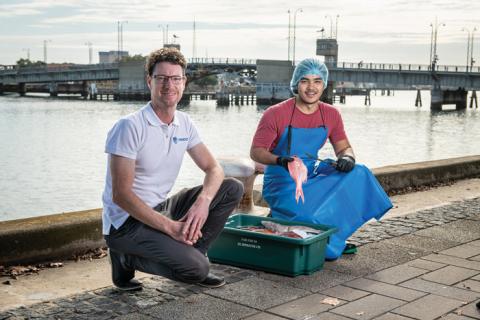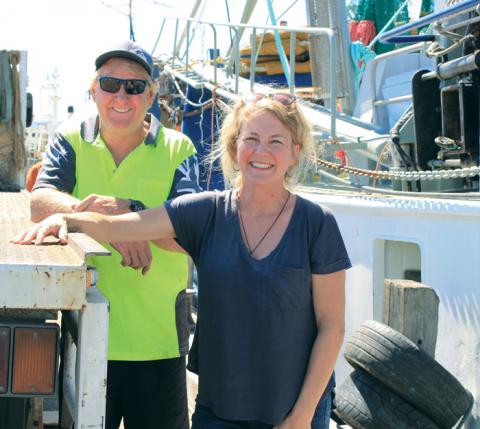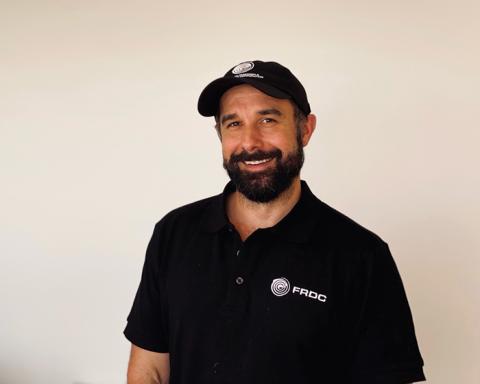FRDC’s new network of extension officers across Australia is focused on improving the two-way exchange of information between the people in fishing and aquaculture and researchers
By Michelle Daw


Extension officer Nathan Bicknell with Nabin Bohara of Fair Fish (SA) at Port Adelaide. Photo: Greg Adams
FFRDC is appointing regionally based extension officers across Australia to directly engage with the people involved in Indigenous, commercial and recreational fishing and aquaculture to increase the adoption of research outcomes and help tailor research and development (R&D) to their needs.
Managing director Dr Patrick Hone says FRDC is creating the network based on feedback from fishing and aquaculture stakeholders.
“They told us that we needed a team on the ground, in the regions, to help accelerate the adoption of R&D outcomes and drive practice change,” he says.
“The extension officers will help increase our engagement with people at the grassroots.”
The extension officers are Nathan Bicknell (South Australia), Kris Cooling (New South Wales), Felicity Horn (Western Australia), Matthew Jones (Victoria), Lauren Thornton (Northern Territory) and Steve Eayrs (Queensland). Recruitment is underway for an extension officer in Tasmania.
Patrick says the new staff have been chosen for their extension skills, experience and knowledge of fishing and aquaculture and their connections to sectors and regional communities.
“Their broad remit is to work with people and stakeholders to extend R&D outputs that meet user needs, incorporate their input into R&D priorities and bring people together to solve problems,” he says.
The extension officers will look at solutions for regional issues in ways that can be adapted across the country, and will help all stakeholders tap into previous, current and future research to find workable solutions.
Seafood Industry Australia (SIA) Chief Executive Officer Veronica Papacosta has welcomed the extension officers and the greater engagement with industry to share knowledge.
“SIA looks forward to these officers growing FRDC’s R&D outputs and providing solutions to industry problems and challenges,” she says.
Amateur Fishermen’s Association Northern Territory Chief Executive Officer David Ciaravolo has also welcomed the embedding of extension officers in the states and territories.
“I am hopeful that the new model will foster closer relationships between end-users and FRDC, which should ensure better uptake of research and improved identification of local research, development and extension needs,” he says.
“Having dedicated resources in the form of local extension officers should help the recreational sector to better identify key opportunities to connect fishers, leaders and managers to relevant research. As a sector we are usually lacking in human resources, so the additional FRDC capacity in extension and engagement at the jurisdictional level is a real positive.”
Nathan Bicknell, SA

Nathan Bicknell, SA. Photo: Greg Adams
Nathan grew up in a rock lobster–fishing family in Port Lincoln, South Australia, and studied environmental science, majoring in fisheries management. He has worked for the Australian Fisheries Management Authority and OceanWatch Australia, and was Executive Officer of the Marine Fishers Association for seven years.
In that role, he represented the interests of licence holders in pursuit of co-management of the state’s Marine Scalefish Fishery. He promoted the public profile of commercial fishing and empowered consumers through an integrated public relations initiative, which enabled them to reduce their food miles and support local fishers. This concept underpinned the award-winning Fair Fish (SA) Co-Operative, Australia’s first community-supported fishery, of which Nathan is an inaugural director.
Most recently, he has been a sector consultant, which has included developing the SA Australian Marine Scalefish Master Fisherman training module in partnership with another consultant on behalf of Wildcatch Fisheries SA and OceanWatch Australia.
Of his role with FRDC, Nathan says he is keen to ensure that commercial, recreational and Indigenous fishers and people working in aquaculture have a chance to be involved in all phases of R&D.
“Traditionally, there has been a linear approach to extension, so after research was done, it was given to the industry to adopt. But I prefer a circular approach where you bring the stakeholders together at the start and involve them in all steps of the process for research, development and extension,” he says.
“Climate change is one of the biggest challenges facing fishing and aquaculture, but it also creates opportunities through new ventures in the blue economy. Examples are aquaculture companies that are growing seaweed as livestock feed to reduce methane emissions or to sequester carbon from the atmosphere.
“These opportunities require an integrated approach to R&D within and across sectors and industries, rather than a business-by-business approach,” he says.
Kris Cooling, New South Wales

Kris Cooling, NSW. Photo: Supplied
“I enjoy meeting people in their own area. They are often more comfortable and open to productive conversations when they are in familiar surroundings, and they appreciate you making the effort to visit.” Kris Cooling, NSW
Kris has worked across a wide spectrum of roles in fisheries and aquaculture since completing First Class Honours in Marine Science and Management at Southern Cross University in 2011.
He has worked for the NSW Department of Primary Industries as a technician and researcher and as an observer on commercial fishing vessels, as a technician at a trout hatchery, as a research assistant for universities, and as floor manager for one of the largest fishing tackle stores in Australia.
While he was working as a fisheries observer in the NSW Estuary General Fishery, it became clear that bait cost and access were a concern, so Kris ran a study comparing the pest species, European Carp (Cyprinus carpio), to two commonly used trap baits, Sea Mullet (Mugil cephalus) and Luderick (Girella tricuspidata).
“Our results showed Carp to be as effective a bait as Luderick and Mullet for male Blue Swimmer Crabs,” he says. “In the right context, carp is cheaper than both native fish and offered the bonus of using a pest species and making the luderick or mullet available for sale.”
Kris says the fishers enjoyed contributing to research and the findings were well received by the local sector.
Kris grew up in Taree, NSW, and is a keen fisher, diver and surfer. He has done volunteer work on cuttlefish behaviour studies and coral health, and aquatic conservation projects with traditional owners in the NT.
He enjoys connecting fishers and other stakeholders to relevant research and is keen to include their insights and innovations in regional and national projects.
“Meeting face to face with people is really valuable, even if it is just kicking tubs down at the local fishing co-op,” he says. “I enjoy meeting people in their own area. They are often more comfortable and open to productive conversations when they are in familiar surroundings, and they appreciate you making the effort to visit.”
Felicity Horn, Western Australia

Felicity Horn, WA. Photo: Supplied
Felicity has 20 years of advocacy experience representing WA’s commercial fishing and aquaculture sectors, and a Bachelor of Science in Aquatic Resource Management – Aquaculture.
She was formerly Executive Officer of the Shark Bay Prawn Trawler Operators’ Association and part-time Administrative Officer for the Aquaculture Council of WA. She has also served as a Board Member of the WA Fishing Industry Council (WAFIC) and the Australian Council of Prawn Fisheries, and she worked for WAFIC for 14 years, including as Executive Officer. During this time, she travelled extensively throughout WA to meet with stakeholders in recreational and commercial fishing, traditional owners, conservation groups and government representatives.
Among her career achievements, Felicity played a key role in assisting commercial, recreational and charter fishing interests to reach agreement on resource sharing issues and had a lead role in the Shark Bay Prawn Fishery’s Marine Stewardship Council certification program.
Felicity grew up in a rock lobster fishing family in Dongara, WA, and is passionate about ensuring that the state’s seafood sector is recognised by the broader community as sustainable, responsible and valuable.
She is keen to support sector and other stakeholder groups to access R&D.
“I think there’s been a gap in this area for a while with many across our sectors wanting to invest in research but not having the time to look into it or knowing how to go about it. I’d like to see my new role bridge that gap.”
Felicity says as a Board Member for the Australian Council of Prawn Fisheries, she saw the practical value of investment in research on topics such as onboard processing and is keen to help other seafood sectors reap similar benefits.
“People in the industry have had their heads down in survival mode, so I’m keen to support them to maximise R&D in areas that will make a tangible difference to their future,” she says.
Dr Matthew Jones, Victoria

Dr Matthew Jones, Victoria.Photo: FRDC
“There is an enormous output of scientific research relevant to fishing and aquaculture in this country and it’s not theoretical science, it’s applied science, but it’s difficult for people in the industry to distil that information in a way that is tangible to them.”
Dr Matthew Jones, Vic.
Matt has worked across the fisheries, aquaculture and maritime sectors for 12 years in Victoria and Tasmania. He graduated with dual degrees of Bachelor of Applied Science (Aquaculture) and Bachelor of Aquaculture from the University of Tasmania, followed by honours and a PhD in aquatic animal nutrition and disease management.
He then took up a role as Fish Health Specialist with Huon Aquaculture, providing technical advice and spending time on the company’s vessels and its broader operations.
He later became a Training and Industry Liaison Officer with Seafood and Maritime Training, working with industries including Atlantic Salmon, oyster and abalone. Matt helped design onboard training on topics such as disease identification, biosecurity, epidemiology and aquatic nutrition and delivered short science courses relevant to finfish, oyster and abalone production.
Matt is an experienced research scientist with a strong emphasis on producing sector-relevant research and communicating outcomes to the sector. He has also worked on farm biosecurity, environmental monitoring and compliance, sea cage and land-based farm design, fishing methods, feeding systems and trials, and animal ethics requirements.
Matt’s most recent role was as Primary Industries Learning and Training Specialist at public training provider, Bendigo Kangan Institute, where he oversaw vocational courses.
“There is an enormous output of scientific research relevant to fishing and aquaculture in this country and it’s not theoretical science, it’s applied science, but it’s difficult for people in the industry to distil that information in a way that is tangible to them,” he says.
He enjoys developing practical approaches to bridge the gap between scientific outcomes and sector. “I’m keen to get science down to the farms and onto the boats and find out industry’s R&D needs. Good, old-fashioned face-to-face contact is so valuable. People get hundreds of emails a day but one hour spent together can make such a difference.”
Lauren Thornton, Northern Territory

Lauren Thornton, NT. Photo: Supplied
A keen angler with a background in natural resource management and stakeholder relations, Lauren has worked in various capacities for Kakadu National Park, through Parks Australia, since 2017. She has been based in Darwin for the past eight months, working with Aboriginal communities to develop new tourism businesses and commercial activities connected with the park.
Previously, she was based in Jabiru, where she managed customer service staff and developed strong networks with traditional owners, local businesses and government agencies. Lauren has a Bachelor of Applied Science in Ecotourism, and she engaged with professionals and scientists to learn more about their work so that she could educate stakeholders and visitors about the work of Parks Australia. She also travelled to remote areas for activities and consultation and coordinated cross-cultural teams of up to six staff to provide interpretation of Kakadu National Park.
While with Parks Australia, Lauren took part in many fishing, camping and boating shows to talk to recreational fishers and other members of the public about regulations that apply to Kakadu National Park and to provide safety information.
Living within the park gave her opportunities to explore its many rivers and fish for Barramundi (Lates calcarifer), despite many close encounters with crocodiles.
Lauren gained an insight into fishing and aquaculture while working on sea-going pearl farm vessels in the NT and WA after leaving school.
She is keen to develop productive relationships between all sectors connected to fishing and aquaculture, and to build on her established networks with Top End stakeholders.
“Having the opportunity to learn about the research and working out the best ways to get it out to the community as an FRDC Extension Officer is a really exciting prospect,” she says. She believes regular contact is key and is keen to immerse herself in community events, such as fishing competitions.
Steve Eayrs, Queensland

Steve Eayrs, Queensland. Photo: Supplied
Steve began his career in the 1980s as a commercial fisher working in prawn trawl fisheries in northern Australia, Saudi Arabia and Burma, and fishing for Orange Roughy (Hoplostethus atlanticus) in Tasmania.
He was then a Fishing Technologist at the Australian Maritime College in Tasmania and was involved in efforts to reduce bycatch in prawn fisheries in Australia, the Middle East, Africa and South-East Asia.
Steve spent 11 years at the Gulf of Maine Research Institute in Portland, Maine, US, where he worked on selective fish-trawl designs and prawn bycatch reduction projects in the Middle East and South America.
He is the Principal Investigator of the SeSAFE project, funded by FRDC, the Australian Maritime Safety Authority and other seafood sector bodies. The SeSAFE project provides online safety training for skippers and crew working in fishing and aquaculture, and Steve will continue in this role part time.
Steve holds a Bachelor of Applied Science in Fishing Technology, a Master of Philosophy in Fisheries, and a PhD in Natural Resources and Earth Sciences.
He enjoys working collaboratively with fishers and other stakeholders to build momentum and inspire change in the seafood sector, including facilitating uptake of research outcomes.
“As an FRDC extension officer, my approach will be to work closely with all stakeholders, recognising their issues, concerns and perspectives, and working towards novel win-win solutions,” he says. f
More information
FRDC extension officers are contacting stakeholders in their jurisdictions. You are welcome to email them at frdc@frdc.com.au.





